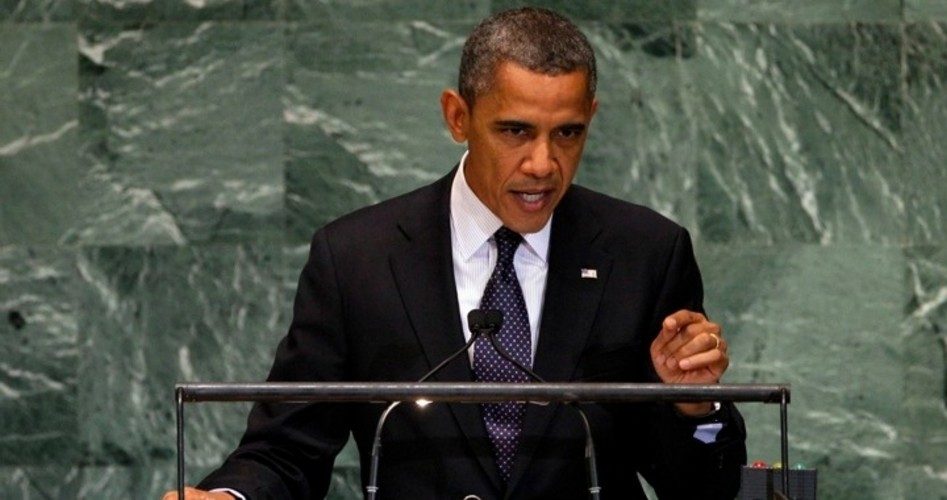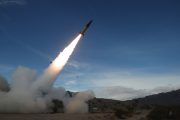
Repeating a hard-line opposition to Iran’s nuclear program, President Barack Obama promised the General Assembly of the United Nations Tuesday that “the United States will do what we must do to prevent Iran from obtaining a nuclear weapon.” While Iran has claimed its development of nuclear power is for peaceful purposes, including energy production and the making of medical isotopes, Obama declared the burden of proof is on the Iranian government to show it is not working toward the production of a nuclear bomb.
“Time and again, it has failed to take the opportunity to demonstrate that its nuclear program is peaceful, and to meet its obligations to the United Nations,” he said of the Tehran regime. “We respect the right of nations to access peaceful nuclear power, but one of the purposes of the United Nations is to see that we harness that power for peace,” the president said. A nuclear-armed Iraq, he warned, “would threaten the elimination of Israel, the security of Gulf nations, and the stability of the global economy. It risks triggering a nuclear-arms race in the region, and the unraveling of the non-proliferation treaty. That is why a coalition of countries is holding the Iranian government accountable. And that is why the United States will do what we must to prevent Iran from obtaining a nuclear weapon.”
Obama’s speech at the United Nations followed by one day Iranian President Mahmoud Amahdinejad’s appearance in New York on Monday, during which he described Israel as one of the “minimal disturbances” in the world that arise and are then “eliminated.” Amahdinejad is in New York for the opening of the annual session of the General Assembly and is scheduled to address that body on Wednesday.
The Iranian president’s threats against Israel and the belief that his government is secretly working to develop nuclear weapons have prompted Republican presidential candidate Mitt Romney and other Republicans to call for harsher economic sanctions against Iran than have already been imposed by the United States and other Western nations. Israel’s Prime Minister Benjamin Netanyahu has called for a tougher stance against Iran and has urged the United States and its allies to define a “red line” beyond which Iran may not go in its nuclear program without triggering military action. The Obama administration is said to be urging the Israeli government to refrain from taking military action on its own against Iran, most likely in the form of air strikes on Iran’s nuclear facilities. Without naming Obama or the United States, Netanyahu said rather pointedly while in the United States last week: “Those in the international community who refuse to put red lines before Iran don’t have a moral right to place a red light before Israel.”
Amahdinejad on Monday said his country would not be intimidated by threats or warnings from Israel.
“Fundamentally we do not take seriously the threats of the Zionists,” he told reporters. “We have all the defensive means at our disposal and we are ready to defend ourselves.” The Iranian leader ignored a warning from UN Secretary-General Ban Ki-moon to refrain from incendiary rhetoric; Reuters reported and repeated his familiar theme that the “Zionists” are interlopers in today’s Middle East and have no legitimate claim to the nation-state of Israel that was established by the United Nations in 1948. While Israel and its supporters claim that the nation’s ties to the land go back thousands of years to biblical times, Amahdinejad dismisses the connection between the modern Jewish state and its counterpart in the ancient world.
“Iran has been around for the last seven, 10 thousand years,” he said speaking through interpreters to reporters at his Manhattan hotel.”They [the Israelis] have been occupying those territories for the last 60 to 70 years, with the support and force of the Westerners. They have no roots there in history.”
In Amahdinejad’s previous appearances at the United Nations, he has denied the Holocaust and questioned the right of the nation of Israel to exist in the Middle East, prompting Western diplomats to walk out during his speeches. On Monday he dismissed Israeli threats of military action as the boast of a nation at a “dead end.”
“We do believe that they have found themselves at a dead end and they are seeking new adventures in order to escape this dead end. Iran will not be damaged with foreign bombs,” he said. “We don’t even count them as any part of any equation for Iran. During a historical phase, they represent minimal disturbances that come into the picture and are then eliminated.”
“President Ahmadinejad’s comments are characteristically disgusting, offensive and outrageous,” White House spokesman Tommy Vietor said in response. “They underscore again why America’s commitment to the security of Israel must be unshakeable, and why the world must hold Iran accountable for its utter failure to meet its obligations.”
Both Democrats and Republicans have been vocal in their support for Israel in this election year, with Romney calling for harsher, “crippling sanctions” against Iran and Republicans frequently accusing Obama of “throwing Israel under the bus,” a charge repeated on Monday by House Majority Leader Eric Cantor of Virginia. Yet Obama insisted in his UN speech that the United States would not allow Iran to obtain a nuclear weapon, claiming that a later attempt to “contain” the threat would be futile.
“Make no mistake: a nuclear-armed Iran is not a challenge that can be contained,” Obama said. That was also the theme of a resolution passed by the U.S. Senate last Friday. The non-binding statement declared the United States must be prepared to take action to prevent Iran from acquiring a nuclear weapon, rather than relying on deterrence to prevent its use. The resolution passed 90-1, with Sen. Rand Paul (R-Ky.) casting the only opposing vote.
“If Iran is ever allowed to obtain nuclear weapons capability, containment will be almost impossible,” said Sen. Lindsey Graham (R-S.C.). Graham, who along with Senators Robert Casey (D-Pa.) and Joseph Lieberman (I-Conn.) was among the original sponsors of the resolution. “My biggest fear is the radical Iranian regime, led by Amahdinejad, would share nuclear technology with terrorist organizations,” Graham said in a statement released shortly before the vote. “We would be under serious threat of attack and close allies like Israel would never know a minute’s peace. In addition, Sunni Arab states in the region would almost certainly seek a nuclear capability of their own to counter Iran,” he added.
Yet reports thus far by the National Intelligence Estimates, based on the findings of all 16 U.S. intelligence agencies, have said there has been no evidence yet that the Iran has decided to build a nuclear weapon, an assessment also given by Secretary of Defense Leon Panetta. Perhaps with the example of the Iraq War in mind, Sen. Paul, in a 26-minute Senate speech, cautioned against going to war with a nation over what it might do with a weapon it does not yet have and may never have. “I think a vote for this resolution is a vote for the concept of preemptive war,” said Paul, calling it “an idea that we will always be perpetually at war.”
Photo of President Obama addressing UN General Assembly: AP Images



